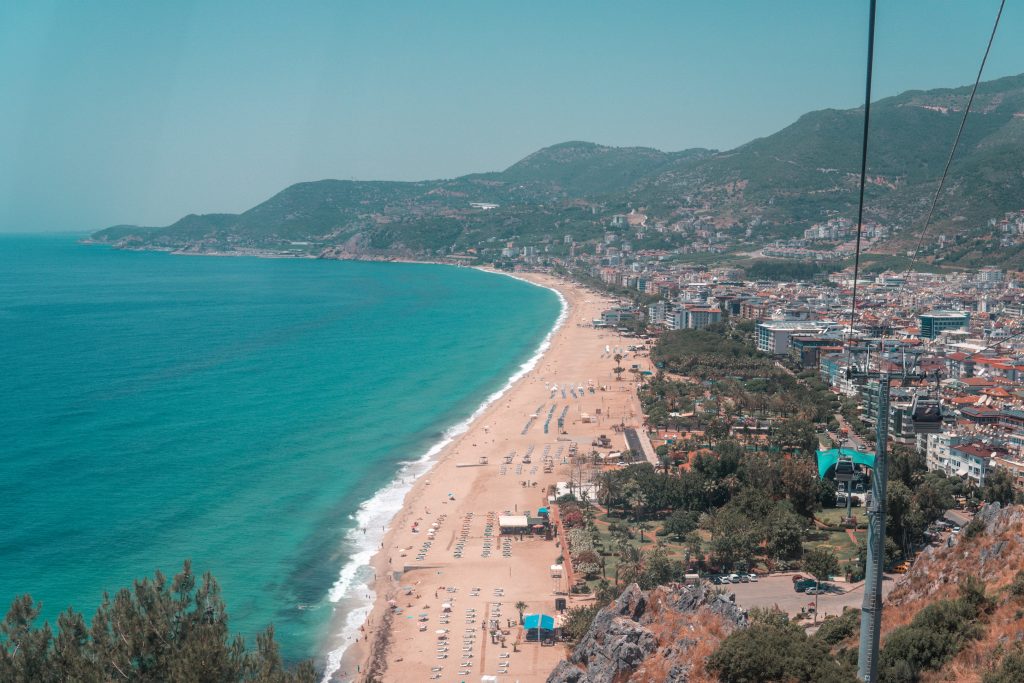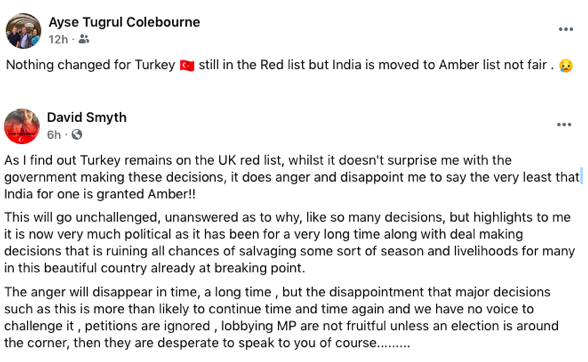Transport Minister Grant Shapps has announced the latest changes to Britain’s coronavirus travel list, with many countries moved into different risk categories, but there has been no change for Turkey, which remains on the highest Red list, infuriating British Turks.
The revised travel list and entry criteria will remain in place for at least another three weeks, when the next government update will be made.
On Wednesday , the government also confirmed that the cost of mandatory stay in a quarantine-approved facility for those returning from Red-list countries is rising. From August 12, the price for a single adult will be an eye-watering £2,285.
A second adult and children aged 12 and older pay a reduced rate of £1,430 for mandatory quarantine, while the charge for each child aged 5-11 remains at £325. Quarantine is free for children aged under five.
The latest travel changes saw Germany added to the Green list, while Mexico was moved to Red. France was shifted from Amber-Plus to Amber, meaning fully vaccinated arrivals from France will no longer need to isolate. There’s no change for Spain, Cyprus (North and South) and Greece, which remain on Amber.
India, Qatar, Bahrain, and the United Arab Emirates, which includes Dubai, have been moved from Red to Amber.
Red-list impacts Ercan Airport travellers to UK
Turkey remains in the high risk category for the third month running. There is also a knock-on effect for Turkish Cypriots and British expatriates, who are adversely affected if they travel to and from Ercan Airport in North Cyprus via Turkey.
The UK travel embargoes on North Cyprus requires all planes to not only touch-down in Turkey, but also that passengers heading back to Britain from Ercan disembark and go through a fresh security screening in an airport in Turkey.
As a result, even though Cyprus is in the Amber risk category, by transiting in Red listed Turkey means travellers returning to Britain from Ercan must also undergo mandatory quarantine, costing them an extra £2,285.
The decision has angered British Turks, who are desperate to see relatives in Turkey and North Cyprus without having to have an expensive bill isolating in a hotel in Britain for 10 days when they return.
Turkey kept on Red list despite Covid cases tumbling
Turkey was placed on the Red list by Britain on 12 May of this year. The country peaked its third Covid wave in April, where new cases rose to a daily high of 63,000 and 400 deaths.
The rapid rise in infections led to the Turkish government ordering the country’s first full national lockdown. Infection rates started to quickly plummet, reaching around the 5,000 mark in May and June. Fatalities from Covid were down too, to around 55 a day.
Despite the drastic improvement in figures in the latter half of May and throughout June, the British authorities have been unwilling to change Turkey’s risk category.
In the past few weeks, Turkey has seen an increase in infection rates, reporting over 20,000 new cases a day in August. However, like the UK, Covid deaths have not increased at the same rate as infections, with around 110 people dying from the virus each day this past week.
In contrast, India, where the Delta variant was first detected resulting in an explosion of Covid-19 infections in April and May of this year, resulting in over 400,000 new cases and more than 4,000 deaths a day at its peak.
After a major drop, the country is again recording increases in coronavirus. Figures from Indian health authorities show an average of 40,000 new cases and 600 fatalities a day, yet the UK Department of Transport decided to move India to the Amber list.
British Turks hit out at decision to keep Turkey on the red list
Writing on her Facebook page Servet Hassan, the former head of community umbrella group the Federation of Turkish Associations UK, posted:
“How come India, the home of Delta variant has been moved to amber list but not Türkiye? There is nothing scientific about this decision, it’s entirely political!”
Mrs Hassan’s accusation that the UK Covid list is “political’ was echoed by David Smyth, who lists his location as Kalkan in Turkey.
“As I find out Turkey remains on the UK red list, whilst it doesn’t surprise me with the government making these decisions, it does anger and disappoint me to say the very least that India for one is granted Amber!!
“This will go unchallenged, unanswered as to why, like so many decisions, but highlights to me it is now very much political as it has been for a very long time along with deal making decisions that is ruining all chances of salvaging some sort of season and livelihoods for many in this beautiful country already at breaking point.”
Ayse Tugrul Colebourne also expressed her disappointment to the news on social media: “Nothing changed for Turkey 🇹🇷still in the Red list but India is moved to Amber list not fair”.
Negatively impacted British travel firms selling holidays to Turkey also aired their frustrations on social media. One company, Falcon VIP Travel, highlighted the inconsistency between keeping Turkey on the Red list and other countries with higher infection rates, who remain on or are moved to Amber.
“This news is especially hard to bear today, after a long 17 months since the start of the pandemic. I really hoped that despite Turkeys slow increase in recent cases following the relaxing of restrictions and their rapid vaccination schedule that we’d see some kind of normality return for the last half of the season here. Sadly that’s not meant to be despite having much lower figures than some other Amber countries.”
UK response to Turkey Red list Parliamentary petition
One challenge to the UK government’s refusal to alter Turkey’s risk category has come from by Gül Gökyokuş, who launched a UK Parliamentary petition started in June to remove Turkey from the UK’s Red list. It has already attracted nearly 40,000 signatures.
Titled “Remove Turkey from the red list”, the petition asks the UK government to, “Review the current status of Turkey and remove Turkey from the red list for international travel,” adding that, “There are millions of people, who lives in the U.K and need to visit their families during summer.”
The British government has issued a statement in relation to the petition after it crossed the 10,000 threshold, guaranteeing a government response. The petition could be debated in the British Parliament if it hits the 100,000 mark.
The statement from the Department of Transport, given in full below, was posted on the Parliamentary petition website on 24 June:
“Turkey was placed on the red list on 12 May to help prevent the importation of variants of concern and to protect the roll out of the COVID-19 vaccination programme at a critical time.
“The government took decisive action to place Turkey on the “Red List” of high-risk countries on 12 May. International visitors will be denied entry to England while British, Irish and third country nationals with residence rights who have departed from or transited through Turkey in the 10 days prior to their arrival in England will be required to quarantine in a government approved facility for 10 days.
“The decision to impose additional measures on Turkey was taken to prevent the importation of variants of concern and to protect the roll out of the COVID-19 vaccination programme at a critical time. These are temporary measures that are kept under constant review and the government maintains that they will only be kept in place whilst the level of risk justifies the measures.
“On 17 May, the government introduced the traffic light system to provide a framework for a safe and sustainable return to international travel. The traffic light system categorises countries based on risk to protect public health and the vaccine rollout from variants of COVID-19. The Joint Biosecurity Centre (JBC) produces risk assessments of countries and territories. Decisions on Red, Amber or Green List assignment and associated border measures are taken by Ministers, who take into account the JBC risk assessments, alongside wider public health factors.
“Key factors in the JBC risk assessment of each country include:
– genomic surveillance capability
– COVID-19 transmission risk
– Variant of Concern transmission risk
“A summary of the JBC methodology is published on gov.uk, alongside key data that supports Ministers’ decisions.
“As with all our coronavirus measures, we keep the Red List under constant review and our priority remains to protect the health of the UK public.”
Main image, top, of Alanya in Antalya, Turkey, from June 2020. Photo © Mert Kahveci / Unsplash





